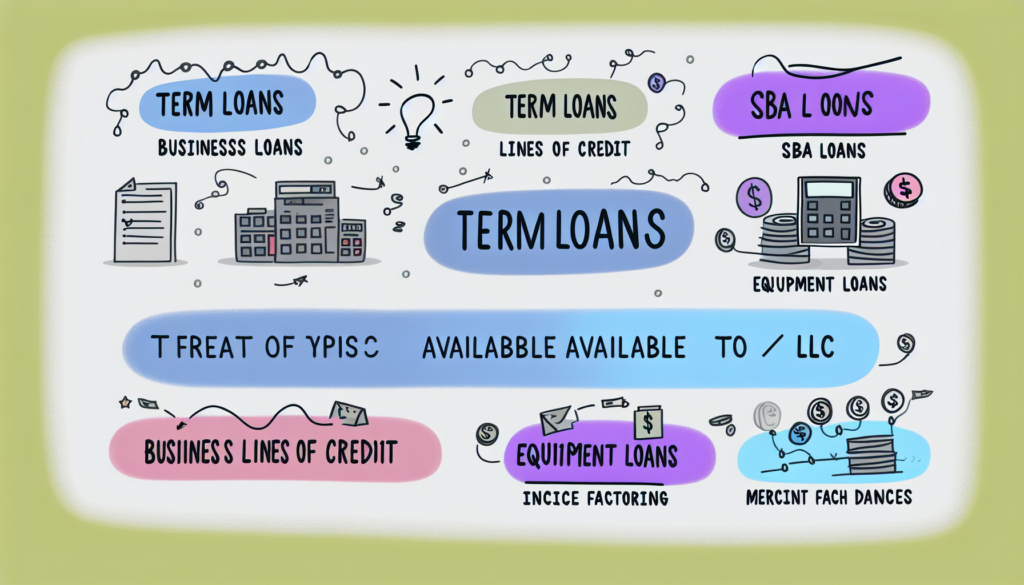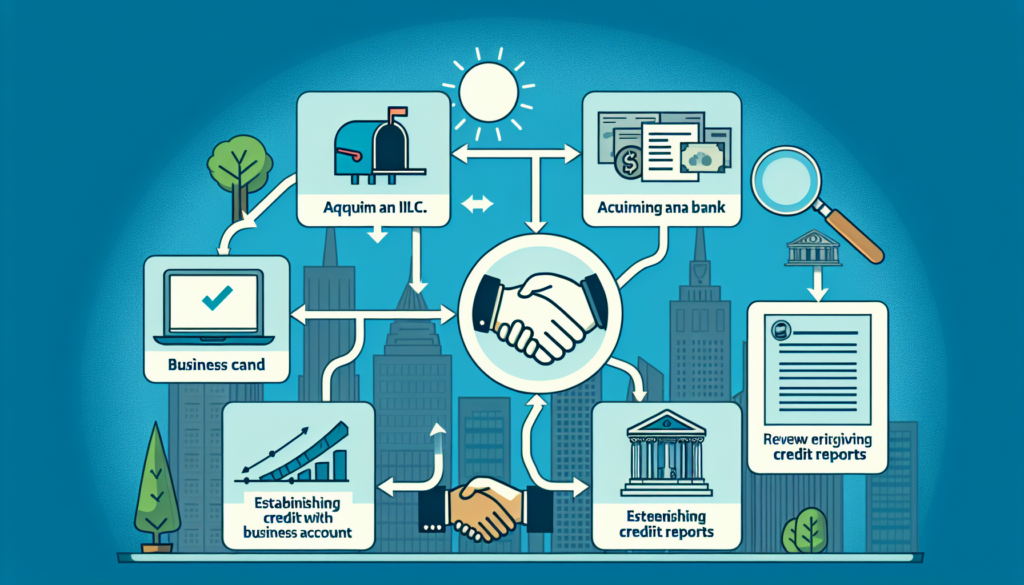Unlocking the Benefits of an LLC Business Loan: A Step-by-Step Guide

Navigating the path to an llc business loan doesn’t have to be complex. This article aims to demystify the process, examining how LLCs can qualify for loans, the types of loans suited for your business, and preparing a strong loan application. Whether you’re looking to expand, invest in new equipment, or boost cash flow, we’ll guide you through the terrain of LLC business financing, focusing on actionable steps to take and common pitfalls to avoid.
Key Takeaways
LLC business loans differ from personal loans by often requiring collateral and contribute to building a business credit profile.
A variety of LLC business loan options are available, including term loans, lines of credit, and SBA-guaranteed loans, each catering to different needs and offering various terms.
Preparation for loan approval involves strengthening business credit, assembling essential documents, and crafting a detailed business plan to demonstrate the company’s potential and repayment capacity.
Defining an LLC Business Loan

An LLC business loan stands tall as a lifeline for limited liability companies seeking a financial boost. These loans provide funding to LLCs, enabling them to grow, innovate, and thrive. More than just a cash injection, an LLC loan ensures a separation between the business entity and the owners’ personal assets, safeguarding your personal finances from business liabilities. To get an LLC loan, explore various lending options tailored to your business needs and understand how an LLC loan works benefits your company.
Unlike personal loans that are usually unsecured and based on an individual’s income and creditworthiness, LLC business loans offer a different set of dynamics. They are often secured by business assets, and in addition to providing necessary funds, they contribute to building a business’s credit profile. The business credit score that these loans help to build opens up a world of benefits, from better loan terms to increased borrowing capacity.
Obtaining an LLC business loan requires an in-depth assessment of the business’s financial status, credit history, and occasionally, a meticulously developed business plan. While this procedure is more complex than acquiring personal loans, the myriad of benefits it reveals makes the endeavor worthwhile.
The Mechanics of an LLC Loan
While understanding the workings of an LLC loan may initially appear complicated, familiarity with the function of business credit bureaus can make the process more manageable. Major players like Dun & Bradstreet, Experian, and Equifax generate business credit reports that lenders use to evaluate an LLC’s creditworthiness, a key factor in loan approval. These credit bureaus assess an LLC’s payment reliability and predict credit risk using different scoring models, such as Dun & Bradstreet’s PAYDEX score and Experian and Equifax’s credit reports.
These bureaus keep comprehensive data, including trade data, bankruptcies, and collections, providing a historic overview of the LLC’s credit performance. While an LLC loan can occasionally affect the personal credit history of the business owner, this can often be avoided when properly structured and paid on time. Whether it’s a lump sum loan with a fixed repayment schedule or flexible options like revolving credits, the impact on both business and personal credit is influenced by the LLC’s repayment performance.
Exploring Types of Loans Available to LLCs

There exists an extensive range of financing options to foster the expansion of a limited liability company (LLC). Among them are:
SBA loans
Term Loans
Business lines of credit
Equipment financing
Invoice factoring services
Merchant cash advances
The realm of finance is abundant with diverse prospects tailored to meet different requirements for businesses.
SBA-Guaranteed Options
The U.S. Small Business Administration (SBA) provides financial support to small business owners, a beacon of hope for those seeking financial aid. SBA-guaranteed loans, also known as sba loans, include:
7(a) loans
504 loans
microloans
export loans
They are tailored to cater to varied business needs. These loans often feature competitive terms, rates, and fees that are on par with non-guaranteed loans. Some programs even offer added benefits like counseling and education support, making them an attractive option for small businesses.
Securing an SBA 7(a) loan involves meeting various eligibility requirements, including operating as a for-profit entity in the U.S., possessing a need for financing, and having a history of annual revenue. And the rewards are worth the effort. Loan amounts for SBA-guaranteed options can vary widely, ranging from a few thousand to $5 million, with the U.S. Small Business Administration ensuring a portion of these loans through approved lenders.
Lines of Credit for Flexibility
For those seeking flexibility, business lines of credit could provide the solution. These options offer a flexible borrowing capacity similar to high-value credit cards, allowing LLCs to draw funds whenever they need and pay interest only on the amount used. This flexibility makes business lines of credit an excellent choice for managing short-term expenses, emergency funds, or even variable costs, all while keeping a firm grip on the interest outlay.
While this financing option provides great flexibility, it’s crucial to be mindful of the lender’s terms. Some lenders may offer interest-only payment options during the draw period, providing LLCs with greater flexibility in managing their monthly financial obligations. But be cautious when getting a business line of credit from online lenders disguising high-cost merchant cash advances as business lines of credit.
Term Loans for Growth Investments
Term loans continue to be the most common and straightforward type of business loan available. These are perfect for funding long-term investments such as purchasing equipment or scaling up business activities. Due to their broad acceptance and use in the marketplace, term loans have become a preferred option for companies looking at growth and expansion opportunities.
Preparing for Loan Approval: What You Need to Know
When seeking a business loan for your LLC, it is vital to take several critical steps. Enhancing your business credit, gathering all necessary legal documents, and developing an effective business plan are all fundamental components in the journey toward obtaining the financing you need for your company.
Strengthening Your Business Credit

Establishing a robust business credit score is akin to setting a sturdy foundation for your financial structure. It starts with:
Obtaining a Federal Tax ID Number (EIN)
Opening a business bank account
Establishing credit with vendors that report to credit agencies
Regularly monitoring business credit reports and correcting any inaccuracies
This is crucial to maintain accurate credit information.
Maintaining a strong personal credit history is equally important. Good credit practices like making on-time payments, keeping credit utilization low, and having a long credit history significantly contribute to FICO scores. By demonstrating financial responsibility, a diversified credit mix, and a solid payment history, you can significantly increase your chances of securing an LLC loan.
Assembling Essential Legal Documents
Assembling essential legal documents for an LLC loan begins with registering the business entity, a process that varies based on the chosen structure and business location. An essential piece of this puzzle is the Federal Tax ID Number (EIN), a crucial legal document that identifies your company and is necessary for legal and financial activities, including loan applications.
Apart from the EIN, lenders require the following documents that prove the stability of the business and the clarity of ownership:
Business plan
Financial statements (balance sheet, income statement, cash flow statement)
Tax returns
Bank statements
Business licenses and permits
Articles of Organization
Operating Agreement
Personal financial statements of the owners
Business contracts and agreements
These documents provide lenders with the assurance of the business’s capacity to repay the loan. These documents are required across various lenders and types of loans, and their thorough assessment is a key part of the loan approval process for LLCs.
Crafting a Persuasive Business Plan
A meticulous and compelling business plan can serve as the magic key unlocking the door to loan approval. It is a testament to the feasibility and potential success of your business, as well as its capacity to repay the loan.
An effective business plan should include the following elements:
Executive summary
Company description
Market analysis
Organizational structure
Product or service details
Marketing strategies
Financial projections
Funding request
Appendix
Each element plays a crucial role in painting a vivid picture of your business, its potential, and how the loan will propel it towards success.
Navigating the Application Process for LLC Business Loans
Securing a business loan for an LLC might seem daunting at first, yet by meticulously comparing various lenders and their offers, systematically arranging your financial records, and carefully completing and forwarding the loan application, you can pave the way for a seamless experience in obtaining the necessary monetary support for your LLC.
Comparing Lenders and Loan Offers

You can begin comparing LLC loan offers by individually approaching banks, credit unions, and online lenders, or by using loan marketplaces for a wider range of options and guidance. It’s essential to choose a loan type based on the financial health and specific needs of the LLC. By comparing offers from different lenders, you can assess the best fit for your business.
Evaluating LLC loan offers involves examining:
Loan type
Amount available
Qualifying criteria
Interest rates and fees
Repayment terms
Speed of funding
A thorough comparison involves not only assessing the loan offers, but also the lenders’ terms and conditions such as interest rates, fees, loan terms, and funding timelines to find the most advantageous deal.
Organizing Financial Documentation
Ensuring that financial records are meticulously maintained is essential for a thriving loan application process. Creditors require key financial statements, including balance sheets, income statements, and cash flow projections, to assess the ongoing fiscal stability of an enterprise.
Lenders necessitate a complete financial portrait which encompasses three years’ worth of bank statements as well as personal and business tax returns coupled with an exhaustive inventory of business liabilities. To compile these documents accurately and fully, enlisting the services of an accountant or utilizing bookkeeping software is advisable for preparing your loan application.
Finalizing and Submitting the Loan Application
Before hitting the submit button, ensure that the final loan application includes an accurate and complete set of required documents, such as:
Financial statements
Tax returns
A detailed business plan
Legal documents related to the LLC
While most lenders offer online applications, some may require visiting a physical location, especially when applying with traditional banks or credit unions.
Online lenders can provide loan application decisions quickly, often in minutes or hours, but traditional lenders may require a longer processing time. Once the loan is approved, it’s essential to carefully review and understand the terms and conditions of the loan agreement, which outlines the details of the loan and the obligations of the borrower.
Securing Your Loan: Collateral and Personal Guarantees
For the majority of business loans, lenders require a personal guarantee. In such cases where an LLC defaults on its loan, you might have to repay the debt using your own funds due to this condition. Depending on whether it’s unlimited or limited, a personal guarantee could expose all your individual assets to satisfy the full amount of the loan and any associated legal expenses or only up to a certain limit that has been agreed upon in advance.
When securing an LLC loan with your private property, be aware there is considerable danger. Failure of your business to fulfill its repayment responsibilities can result in losing those very assets. It’s crucial for entrepreneurs considering this option to evaluate how critical each asset is and if they’re able to either recoup them down the line – alongside scrutinizing what kind of risk doing so will entail for their financial standing overall.
Managing Your LLC Loan: Repayment and Default Scenarios
Upon securing your LLC loan, effective management of loan repayments takes precedence. Prioritizing loan payments in the company’s budget, placing them before non-essential spending, can ensure loan repayment runs smoothly.
Adjusting the LLC’s budget based on actual income and expenditures can help ensure loan payments are made on time. This could involve cost reductions or allocating unexpected revenue to the loan. Making additional payments on the loan when financially feasible can reduce the overall interest accrued and potentially shorten the loan term. But remember to be aware of any prepayment penalties.
Alternatives to Traditional LLC Loans

In addition to traditional LLC business loans, there are numerous alternative lending options for LLCs. High-cost merchant cash advances, for instance, can provide fast access to capital, especially useful for businesses with seasonal cash flow needs or those lacking other collateral.
Equipment financing options are suitable for businesses needing to finance large equipment acquisitions, using the equipment itself as collateral. Invoice factoring allows companies to receive immediate cash by trading unpaid invoices.
Alternative lending options like business credit cards and factor rates-based lines of credit offer opportunities for financing that do not impact the owner’s personal credit score and cater to businesses with varying credit backgrounds.
Leveraging Good Credit for Favorable Loan Terms
Possessing a strong personal credit profile can be highly influential when seeking LLC business loans. It often leads to better loan conditions, like reduced interest rates, which could translate into substantial savings across the duration of the loan.
A commendable credit profile encompasses much more than just your credit score. It requires diligent debt management. This means consistently paying bills promptly, managing low balances on credit cards, and minimizing the frequency of hard inquiries. Adhering to these healthy financial behaviors enhances your likelihood of obtaining business loans with advantageous terms.
When an LLC Fails: Understanding Personal Liability
The collapse of an LLC can bear substantial consequences, especially when personal guarantees and collateral come into play. Lenders may require personal guarantees from LLC members, and if the business fails, such guarantees allow creditors to pursue personal assets of the individual members.
If an LLC member personally guarantees the LLC’s debts, they waive their limited liability protection and may become responsible for the business’s debts. Using personal assets as collateral for business debts also risks those assets being claimed by lenders if the business fails.
In the event of an LLC bankruptcy, creditors are limited to claiming the business assets, and after those are liquidated and distributed, the individual members’ personal assets are usually protected from further claims.
Summary
In the financial landscape of LLCs, business loans serve as a cornerstone for growth and success. From understanding what an LLC business loan is to the mechanics of securing one, a plethora of options await. With a diverse array of loan types, from SBA-guaranteed options to flexible lines of credit and term loans, there’s a financial solution for every LLC.
Preparation is key, from strengthening your business credit to assembling essential legal documents and crafting a persuasive business plan. A comprehensive comparison of lenders and loan offers, coupled with diligent financial documentation and a well-prepared loan application, can streamline the loan procurement journey. While personal guarantees and collateral may involve personal liability, managing loan repayments effectively and understanding default scenarios can mitigate risks. And if traditional loans don’t fit the bill, alternative lending options are always on the table. The financial journey of your LLC starts here. Let’s turn the key and unlock the door to success.
Frequently Asked Questions
Can you take a loan from your LLC?
Yes, you can take a loan from your LLC, but you’ll need approval from other members if you’re not the sole owner and must follow specific rules to avoid penalties or risks.
What credit score does an LLC start with?
Launching an LLC is achievable regardless of your credit standing. Possessing bad credit can present significant setbacks. This often includes challenges in securing business financing. It’s crucial to reflect on how your credit may influence the financial opportunities for your LLC.
Does an LLC business loan affect personal credit?
If an LLC secures a business loan, it shouldn’t impact your individual credit score. This holds true provided that the loan isn’t recorded as personal borrowing against your Social Security number by the financial institution.
What is an LLC business loan?
An LLC business loan offers funding specifically for limited liability companies, helping to keep business and personal assets separate.
What documents do I need to apply for an LLC loan?
To apply for an LLC loan, you’ll need to provide core financial documents like balance sheets, income statements, and cash flow statements, as well as three years of bank statements, personal and business tax returns, and a detailed list of business debts.
Good luck with your application!